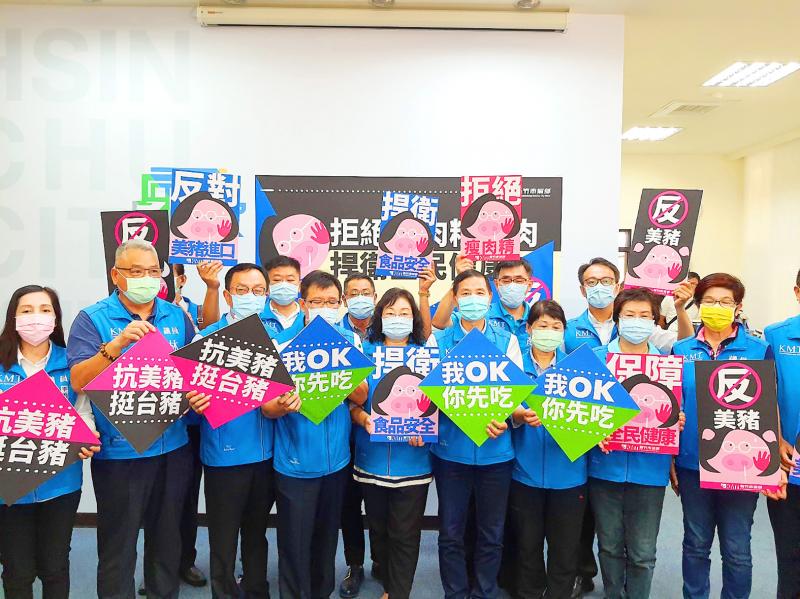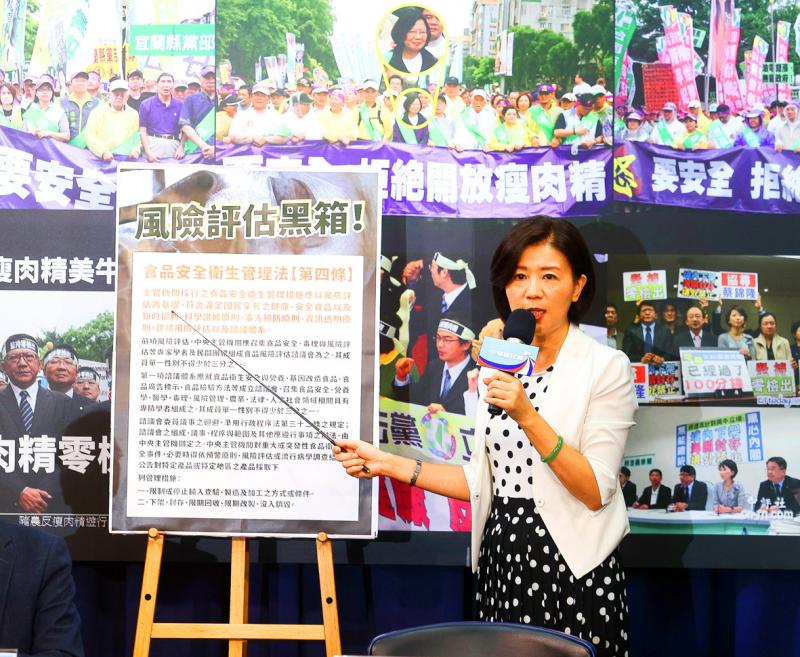The Chinese Nationalist Party (KMT) yesterday said it is planning to push for cities and counties nationwide to implement ordinances that would effectively ban pork containing ractopamine.
KMT Chairman Johnny Chiang (江啟臣), Taitung County Commissioner Yao Ching-ling (饒慶鈴), Taitung County Council Speaker Wu Hsiu-hua (吳秀華) and other members of the KMT Taitung County Council caucus held a news conference at the council to protest the Democratic Progressive Party (DPP) government’s decision to allow the import of US pork containing ractopamine.
“Is this the era of authoritarianism?” they asked.

Photo: Hung Mei-hsiu, Taipei Times
The KMT said that it would supervise the central government’s decision through its caucuses in county and city councils or set local ordinances to block it.
People’s health is more important than anything, Chiang said, accusing President Tsai Ing-wen’s (蔡英文) administration of not communicating with the public, refusing to be subject to supervision and making the decision rashly.
The Tsai administration announced that it would relax restrictions on US pork and beef without any regard for the local industry and people’s health, and without public consensus, he said.

Photo: CNA
Chiang also accused the DPP of having double standards, saying that it had previously opposed the use of ractopamine.
According to the Local Government Act (地方制度法), health management is a local government matter, and local governments have the authority to formulate such ordinances, he said.
Some cities and counties have already formulated ordinances banning ractopamine, he said, adding that KMT city and county caucuses would demand that local governments enforce those ordinances.
In cities and counties where such ordinances have not been put in place, the caucuses would work to ensure they are, the KMT said, adding that such ordinances are in place in some cities and counties, but could be improved upon.
At a separate news conference, New Taipei City Councilor and KMT spokeswoman Chiang I-chen (江怡臻) said that the KMT New Taipei City Council caucus would this week propose amendments to the city’s food safety ordinance to require “zero” traces of ractopamine in US pork.
KMT Culture and Communications Committee chairwoman Alicia Wang (王育敏) asked whether the Tsai administration had conducted a proper risk assessment regarding its decision to allow US pork containing ractopamine.
Wang said the decision was made in haste and failed to follow proper administrative procedure.
Former president Ma Ying-jeou’s (馬英九) administration had to make some compromises to bolster international trade, but it insisted on separate policies for pork and beef, because Taiwanese consume less beef, Wang said.
However, the Tsai administration made compromises on the import of pork and internal organs of the animals, she said, adding that the decision would have a great impact on the health of Taiwanese.
The Ma administration also faced pressure on the issue, Wang said, but added that the health of people should be the “bottom line.”
Separately yesterday in response to media queries, New Taipei City Mayor Hou You-yi (侯友宜) of the KMT asked if health risk evaluations regarding the import of US pork and beef have been completed, and whether there are supporting measures to safeguard people’s health.
Taipei Mayor Ko Wen-je (柯文哲) said the central government’s announcement was too abrupt, adding that it appeared “domineering” by setting the implementation date for Jan. 1 without discussing it with the public in advance.
He said that the DPP should explain why imported pork can contain ractopamine residue, but domestic pig farmers are prohibited from using the substance.
The party should also explain its control measures and whether internal organs of pigs would also be allowed to be imported.
Additional reporting by Lee I-chia

ALIGNED THINKING: Taiwan and Japan have a mutual interest in trade, culture and engineering, and can work together for stability, Cho Jung-tai said Taiwan and Japan are two like-minded countries willing to work together to form a “safety barrier” in the Indo-Pacific region, Premier Cho Jung-tai (卓榮泰) yesterday said at the opening ceremony of the 35th Taiwan-Japan Modern Engineering and Technology Symposium in Taipei. Taiwan and Japan are close geographically and closer emotionally, he added. Citing the overflowing of a barrier lake in the Mataian River (馬太鞍溪) in September, Cho said the submersible water level sensors given by Japan during the disaster helped Taiwan monitor the lake’s water levels more accurately. Japan also provided a lot of vaccines early in the outbreak of the COVID-19 pandemic,

Kaohsiung Mayor Chen Chi-mai (陳其邁) on Monday announced light shows and themed traffic lights to welcome fans of South Korean pop group Twice to the port city. The group is to play Kaohsiung on Saturday as part of its “This Is For” world tour. It would be the group’s first performance in Taiwan since its debut 10 years ago. The all-female group consists of five South Koreans, three Japanese and Tainan’s Chou Tzu-yu (周子瑜), the first Taiwan-born and raised member of a South Korean girl group. To promote the group’s arrival, the city has been holding a series of events, including a pop-up

TEMPORAL/SPIRITUAL: Beijing’s claim that the next Buddhist leader must come from China is a heavy-handed political maneuver that will fall flat-faced, experts said China’s requirement that the Dalai Lama’s reincarnation to be born in China and approved by Beijing has drawn criticism, with experts at a forum in Taipei yesterday saying that if Beijing were to put forth its own Dalai Lama, the person would not be recognized by the Tibetan Buddhist community. The experts made a remarks at the two-day forum hosted by the Tibet Religious Foundation of His Holiness the Dalai Lama titled: “The Snow Land Forum: Finding Common Ground on Tibet.” China says it has the right to determine the Dalai Lama’s reincarnation, as it claims sovereignty over Tibet since ancient times,

Temperatures in some parts of Taiwan are expected to fall sharply to lows of 15°C later this week as seasonal northeasterly winds strengthen, the Central Weather Administration (CWA) said today. It is to be the strongest cold wave to affect northern Taiwan this autumn, while Chiayi County in the southwest and some parts of central Taiwan are likely to also see lower temperatures due to radiational cooling, which occurs under conditions of clear skies, light winds and dry weather, the CWA said. Across Taiwan, temperatures are to fall gradually this week, dropping to 15°C to 16°C in the early hours of Wednesday